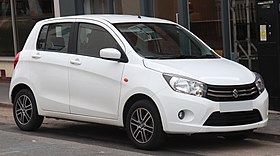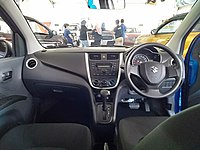Suzuki Celerio
| Suzuki Celerio | |
|---|---|
 2017 Suzuki Celerio SZ4 (UK) | |
| Overview | |
| Manufacturer | Suzuki |
| Also called |
|
| Production | 2008–present |
| Body and chassis | |
| Class | City car (A) |
| Body style | 5-door hatchback |
| Layout | Front-engine, front-wheel-drive |
| Chronology | |
| Predecessor | Suzuki Zen Estilo (second generation, India) Suzuki A-Star (India) Suzuki Cultus (second generation, Pakistan) |
The Suzuki Celerio is a hatchback city car produced by the Japanese manufacturer Suzuki since 2008. Originally a rebadged Alto/A-Star city car for some markets, the Celerio was made as a global nameplate and a standalone model replacing the A-Star in 2014. Suzuki unveiled the second-generation Celerio at the Auto Expo 2014 in India,[1] after being previewed as the A:Wind concept model at the Thailand International Motor Expo in November 2013.[2][3] The third-generation model was unveiled in November 2021.[4] In 2023, the third-generation model was also marketed by Toyota in African markets as the Toyota Vitz.
First generation (2008)
[edit]
Prior to being developed as a standalone model from the second generation onwards, the "Celerio" nameplate was first used for the rebadged Alto/A-Star in some markets between 2008 and 2013.
Second generation (FE; 2014)
[edit]| Second generation (FE) | |
|---|---|
 2015 Suzuki Celerio 1.0 Club (Germany) | |
| Overview | |
| Also called | Suzuki Cultus (Pakistan) |
| Production | 2014–2021 (India) 2017–present (Pakistan) 2014–present (Thailand) |
| Assembly | India: Manesar (Maruti Suzuki) Thailand: Rayong (Suzuki Thailand) Pakistan: Karachi (Pak Suzuki Motors) |
| Powertrain | |
| Engine |
|
| Transmission |
|
| Dimensions | |
| Wheelbase | 2,425 mm (95.5 in)[5] |
| Length | 3,600 mm (141.7 in)[5] |
| Width | 1,600 mm (63.0 in)[5] |
| Height | 1,540 mm (60.6 in)[5] |
| Curb weight | 785 kg (1,731 lb)[5] |
The second-generation Celerio was launched in India as a standalone model with six variants.[6] The diesel version of Celerio was introduced in the second quarter of 2015. The hatchback is currently available in petrol and CNG fuel options.[7] The Celerio X is a premium variant of Celerio with a sportier look, equipped with AGS technology, Striking X graphic and grille design.
The petrol engine is a Suzuki K-series K10B latest revision called K-Next (not same as Wagon R K10B, because Wagon R has compression ratio of 10:1 while Celerio/Cultus has 11:1).[8][9] The gearbox is basically a manual transmission with a transmission control unit (TCU) that actuates the hydraulics to shift the gears.[10]
It was launched on the European market in the second half of 2014, having its European premiere at the Geneva Motor Show in March 2014.[11] However, the British, Irish, Australian and New Zealand market (ceased being built for UK/IE market in 2019, 2021 for Australasia) were produced in the Suzuki's Rayong manufacturing plant in Thailand. The Australasian market model lacked a fifth seatbelt.
The Pakistani version of the Celerio, using the Cultus nameplate, was launched in 2017 after the previous generation of the facelifted Suzuki Cultus was discontinued due to poor sales and an outdated exterior. Pak Suzuki Motors had launched the rebadged Celerio in three variants: VXR, VXL, and VXL AGS. While the VXR variant lacked airbags, power mirrors, ABS, and fog lights, both the VXR and VXL variants were offered with a 5-speed manual transmission, while the VXL AGS variant was offered with a 5-speed automatic gearbox. Later in 2020, Sat-Nav was also available on VXL models. This was also the first Pakistani car that had AGS technology.
The Pakistani variant of the Celerio was offered under the original name by Maruti Suzuki in India and Suzuki Motor Thailand in Rayong Province Thailand. The Celerio replaces the A-Star and Zen Estilo.[12][13]
-
2017 Suzuki Celerio SZ4 (UK)
-
Interior
Safety
[edit]The India version of the Celerio was awarded zero stars by the Global NCAP after a test conducted in May 2016 (similar to Latin NCAP 2013).[14][15] The basic version of the Celerio in India and Pakistan does not include airbags nor ABS and the body shell of the vehicle was rated by the Global NCAP as "unstable".[16]
Latin NCAP awarded the Indian-made Latin American version with 2 airbags 4 stars in 2013.[17]
The European Suzuki Celerio scored 3 of 5 stars when tested by Euro NCAP in 2014 (similar to Latin NCAP 2020) and 4 of 5 by ANCAP in 2015.[18][19] ANCAP and Euro NCAP received criticism claiming they underscored the Celerio relative to other cars that had fewer airbags or performed worse in crash tests.[20]
Diesel
[edit]Maruti Suzuki introduced its all new 793 cc diesel engine in the Celerio on 3 June 2015, at a price of INR 4.65 lacs. The Celerio DDiS125 is powered by Suzuki’s first indigenously developed two-cylinder motor which delivers 49 hp; 37 kW (50 PS) of max power and 125 Nm of peak torque. It also promises to deliver a segment best mileage of 3.6 L/100 km (27.62 km/L).
Externally, the Celerio diesel is identical to its petrol version.[21] The Celerio diesel variant was discontinued in February 2017.[22]
Third generation (2021)
[edit]| Third generation | |
|---|---|
 2021 Maruti Suzuki Celerio ZXi+ (India) | |
| Overview | |
| Also called | Toyota Vitz (Southern Africa) |
| Production | 2021–present |
| Assembly | India: Manesar (Maruti Suzuki) |
| Designer | Takashi Maeda[23] |
| Body and chassis | |
| Platform | Suzuki HEARTECT platform |
| Related | |
| Powertrain | |
| Engine |
|
| Transmission | |
| Dimensions | |
| Wheelbase | 2,435 mm (95.9 in) |
| Length | 3,695 mm (145.5 in) |
| Width | 1,655 mm (65.2 in) |
| Height | 1,555 mm (61.2 in) |
| Curb weight | 800–825 kg (1,764–1,819 lb) |
| Chronology | |
| Predecessor | Toyota Agya (Vitz, South Africa)[24] |
The third-generation Celerio was unveiled in India on 10 November 2021.[25][26] The car is built on lightweight HEARTECT platform that also underpins Wagon R and Ignis. It is powered with a 1.0-liter K10C Dualjet engine which is a reworked K10B engine with dual fuel injectors per cylinder (Dual VVT) and several other modifications.
In January 2023, the third-generation Celerio was introduced in South Africa and some other RHD Southern Africa markets under the Toyota brand as the Toyota Vitz. Reusing the nameplate from the older Japanese market Yaris, the Vitz replaced the Agya as Toyota's entry level, A-segment car in the country.[24]
-
Rear view
Sales
[edit]| Year | India | Thailand |
|---|---|---|
| 2014 | 67,616 | 1,862[27] |
| 2015 | 82,961 | 2,487[28] |
| 2016 | 90,481 | 1,187[29] |
| 2017 | 100,860 | 922[30] |
| 2018 | 100,957 | |
| 2019 | 82,961 | |
| 2020 | 4,351[31] |
References
[edit]- ^ CarWale Team (6 February 2014). "Maruti Suzuki launches the Celerio for Rs 3.90 lakh at the Auto Expo 2014". Carwale.com. Retrieved 6 February 2014.
- ^ "Global News News.2013 | Global Suzuki".
- ^ "Global News News.2014 | Global Suzuki".
- ^ "Maruti Suzuki launches all-new Celerio in India; Price starts at Rs 4.99 lakh". 10 November 2021.
- ^ a b c d e "Archived copy" (PDF). Archived from the original (PDF) on 15 December 2017. Retrieved 28 March 2016.
{{cite web}}: CS1 maint: archived copy as title (link) - ^ "Maruti Suzuki Celerio". Overdrive. Retrieved 11 March 2014.
- ^ "Maruti Suzuki Celerio Diesel to hit the Indian market". CarTrade. Retrieved 2 February 2015.
- ^ "Suzuki Celerio Makes European Debut at 2014 Geneva Motor Show | MotorBeam – Indian Car Bike News & Reviews". Archived from the original on 12 May 2014. Retrieved 11 May 2014.
- ^ "Maruti Suzuki Celerio - India's First Auto Gear Shift car with EZ Drive Technology". Archived from the original on 11 May 2014. Retrieved 11 May 2014.
- ^ "How does Maruti Celerio's Auto gearbox work?". Retrieved 1 February 2014.
- ^ "Global News News.2014 | Global Suzuki".
- ^ Chauhan, Chanchal Pal (7 February 2014). "Auto Expo 2014: Maruti Celerio hatchback launched at a starting price of Rs 3.90 lakh". The Economic Times. Archived from the original on 8 February 2014. Retrieved 28 February 2014.
- ^ Mohan, Anand (14 February 2014). "Maruti Celerio: Competition Check". The Economic Times. Retrieved 28 February 2014.
- ^ "Zero Stars For All Cars In Latest Global NCAP Crash Tests". Global NCAP. 17 May 2016. Retrieved 29 March 2018.
- ^ "Archived copy" (PDF). Archived from the original (PDF) on 27 May 2016. Retrieved 22 August 2016.
{{cite web}}: CS1 maint: archived copy as title (link) - ^ "Celerio, Kwid, Scorpio among Indian cars scoring zero in safety test". 17 May 2016. Retrieved 22 August 2016.
- ^ "Official results of the Suzuki Celerio + 2 Airbags 2013". LATIN NCAP - PARA AUTOS MAS SEGUROS.
- ^ "Euro NCAP safety test, Suzuki Celerio" (PDF). Euro NCAP. Retrieved 23 July 2015.
- ^ "Suzuki Celerio (2015 – Sep 2021) Crash Test Results | ANCAP". www.ancap.com.au.
- ^ "ANCAP confuses with Renault Captur and Suzuki Celerio safety ratings". CarsGuide.
- ^ Juneja, Akshit (6 June 2015). "Maruti Suzuki Celerio Diesel Launched". CarDekho.com. Archived from the original on 20 August 2017.
- ^ Shah, Ronak. "Diesel variants of Maruti Suzuki Celerio discontinued". ET Auto. Retrieved 30 October 2017.
- ^ "JP, 1687747, S". Japan Platform for Patent Information. Retrieved 8 May 2022.
- ^ a b Merwe, Jaco Van Der (27 January 2023). "Starting with the Vitz, Toyota plans to give SA cheaper cars". The Citizen. Retrieved 2 February 2023.
- ^ "Suzuki Unveils the All-New Celerio in India". Global Suzuki (Press release). 10 November 2021.
- ^ Shah, Pradeep (10 November 2021). "2021 Maruti Suzuki Celerio India Launch Highlights: India's most fuel-efficient car priced at Rs 4.99 lakh". The Financial Express. Retrieved 10 November 2021.
- ^ "Thailand cars sales report 2014". HeadlightMag.com. Thailand. February 2015. Retrieved 24 October 2018.
- ^ "Thailand cars sales report 2015". HeadlightMag.com. Thailand. 10 June 2016. Retrieved 24 October 2018.
- ^ "Thailand cars sales report 2016". HeadlightMag.com. Thailand. 26 January 2017. Retrieved 24 October 2018.
- ^ "Thailand cars sales report 2017". HeadlightMag.com. Thailand. 29 January 2018. Retrieved 24 October 2018.
- ^ "Sales Report ยอดขายรถยนต์ กลุ่มรถ SubCompact Hatchback (ECO / B-SEG) : เดือน มกราคม – ธันวาคม 2020". HeadLight Magazine (in Thai). 12 February 2020. Retrieved 5 February 2021.
External links
[edit] Media related to Suzuki Celerio at Wikimedia Commons
Media related to Suzuki Celerio at Wikimedia Commons- Official website



